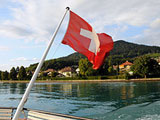EU: Swiss avoid guillotine
By Andrew Rhys Thompson for ISN
Swiss voters have convincingly ratified the latest set of bilateral agreements with the European Union in an 8 February national referendum, with almost 60 percent supporting the expansion of the comprehensive accords to also include the newest EU members, Romania and Bulgaria.
While votes pertaining to EU relations and the process of European integration are never a foregone conclusion in historically isolationist and traditionally EU-skeptic Switzerland, it was nevertheless the fifth consecutive time that Swiss voters supported and expanded the far-reaching set of treaties regulating and formalizing all political, economic and cultural relations between Switzerland and the EU.
The concept of bilateral agreements and its large package of associated treaties was initially negotiated by Swiss and EU emissaries in the late 1990s. It was designed to be a custom-made Swiss solution to harmonizing all relations with the EU without formally joining the bloc.
In 2000, Swiss voters approved the initial package with a striking 67 percent margin. This was followed by approvals for the Swiss accession to the integrated Schengen no-passport zone in 2005 and also acceptance that year for the first expansion of the bilateral agreements to also include the 10 new EU countries that had joined the Union in 2004. These national referendums were approved with 55 and 56 percent margins, respectively.
The year 2006 saw the passage of an EU-required Swiss economic development and stimulus package for the 10 new EU member states, which was also approved, although with a somewhat narrower majority of only 53 percent.
The comfortable margin of success on 8 February for the expansion of the bilateral agreements to also include Romania and Bulgaria hence signifies a strong level of consistency from the Swiss voters and echoes a general endorsement of the bilateral process and a desire for continuity and stability in the country's European relations. The rather clear-cut margin of approval, with 60 percent, is all the more surprising, as opinion polls prior to the vote had shown supporters to tally mainly 49 percent and opponents reaching as much 43 percent.
As with most EU-related referendums in Switzerland, on 8 February, the approval margins where the highest in the French-speaking part of the country and in the Cantons of Vaud, Neuchâtel and Jura, with support in Vaud even reaching as high as 70 percent. Also the large German-speaking and urban Cantons of Basel, Bern and Zurich were able to deliver strong approval margins. All in all, only four of 26 cantons rejected the measure, opposition being strongest in the Italian-speaking Ticino (66 percent).
The passage of the latest (and not likely last) bilateral package is a particularly significant success for the Swiss government. Both the country's executive branch Federal Council and the parliament had heavily lobbied in their favor, and in turn had also received strong backing from all influential economic associations and labor unions.
Indeed, especially economic arguments and the country's dependency on the European export markets as well as the maintenance of favorable trade advantages with the EU, were, as in all previous bilateral votes, the most important arguments for supporters of the measures.
An added element of increased intensity and unusual urgency for the Swiss government was the "guillotine clause," which the EU had inserted into the bilateral treaties and which would have meant that had Switzerland refused the expansion of the bilateral agreements to Romania and Bulgaria, all prior agreements could have also become potentially invalid and obsolete. This looming specter could have left the Swiss government's EU policy as well as the country's general European status in shambles, and threatened to turn a nine-year political process upside down, simply becasuse of one referendum result.
The most important argument of the government and all other backers of the bilateral agreements with the EU was hence the emphasis of the need to refrain from dangerous political experiments in economically uncertain times, and the suggestion to not endanger the European course already chosen back in 2000.
Of all the major political parties in Switzerland, only the rightist-populist and traditionally fierce anti-EU People's Party (SVP) advocated rejection of the measures, trying to raise fears of mass-migration from Southeastern Europe to Switzerland and a general increase in crime and unemployment. The decisive outcome of the vote seems to suggest however that the Swiss electorate was not swayed by the rationale of the SVP's arguments, and the acceptance of the Romanian and Bulgarian package signifies the SVP's fifth straight domestic defeat on EU related ballot issues.
For the EU, the resounding Swiss approval comes at a valuable time, when it is still also consolidating its own position and trying to overcome its internal roadblock by looking for a way to move along and finally pass the Treaty of Lisbon, which still requires passage from both the Czech Republic and Ireland.
European Commission President José Manuel Barroso was quick to send official praise and recognition to Bern, while the German news magazine Der Spiegel even called the Swiss electorate "The Good Europeans" in one headline.
While the EU sorts out its own issues related to Lisbon and holds accession negations to finalize Croatia's entry into the Union in 2010 or 2011, the Swiss will not likely be asked to vote on the issue for another three to four years.

